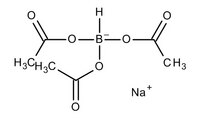843705 Sigma-AldrichSodium triacetoxyborohydride
Sodium triacetoxyborohydride for synthesis. CAS 56553-60-7, molar mass 211.94 g/mol.
More>> Sodium triacetoxyborohydride for synthesis. CAS 56553-60-7, molar mass 211.94 g/mol. Less<<Recommended Products
Overview
| Replacement Information |
|---|
Key Spec Table
| CAS # | Hill Formula | Molar Mass |
|---|---|---|
| 56553-60-7 | C₆H₁₀BNaO₈ | 211.94 g/mol |
Pricing & Availability
| Catalogue Number | Availability | Packaging | Qty/Pack | Price | Quantity | |
|---|---|---|---|---|---|---|
| 8437050025 |
|
Glass bottle | 25 g |
|
— | |
| 8437050100 |
|
Glass bottle | 100 g |
|
— |
| Description | |
|---|---|
| Catalogue Number | 843705 |
| References |
|---|
| Product Information | |
|---|---|
| CAS number | 56553-60-7 |
| Hill Formula | C₆H₁₀BNaO₈ |
| Molar Mass | 211.94 g/mol |
| HS Code | 2942 00 00 |
| Structure formula Image | |
| Quality Level | MQ200 |
| Applications | |
|---|---|
| Application | Sodium triacetoxyborohydride for synthesis. CAS 56553-60-7, molar mass 211.94 g/mol. |
| Biological Information |
|---|
| Physicochemical Information | |
|---|---|
| Density | 1.36 g/cm3 (20.1 °C) |
| Melting Point | 111 - 111.2 °C |
| Dimensions |
|---|
| Materials Information |
|---|
| Toxicological Information |
|---|
| Safety Information | |
|---|---|
| Categories of danger | highly flammable, irritant |
| Product Usage Statements |
|---|
| Storage and Shipping Information | |
|---|---|
| Storage | Store below +30°C. |
| Packaging Information |
|---|
| Supplemental Information |
|---|
| Specifications | |
|---|---|
| Assay (acidimetric) | ≥ 96.0 % |
| Identity (IR) | passes test |
| Global Trade Item Number | |
|---|---|
| Catalogue Number | GTIN |
| 8437050025 | 04027269059460 |
| 8437050100 | 04027269059477 |

















